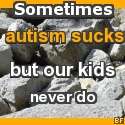I have no idea.
By the word normal, I mean typical. Regular. What you expect to get when you get a kid. The word most people use anyway, whether or not it's PC these days or not...
I'll go ahead and say it: My kids are not normal. I can be OK with that to a point. There are a lot of people that are not normal. I sure don't mean to step on any toes here, so please don't take offense. I am in no way trying to insult anyone or anyone else's kids. But my sweet kids, they are not normal.
I have three children. E (boy) is 11, L (boy) is 6 and K (girl) is almost 2. E has Asperger's ADHD and OCD, L has high functioning Autism and K is speech impaired, very delayed in all areas and though not diagnosed yet, she stims and requires a lot of special accommodating, just like her brothers.
I suppose people feel sorry for me and my husband, but I don't want anyone to. I just would love for people to be more educated about this messed up world of Autism. How there are so many degrees, variations, exceptions, labels, theories, treatment options and it's confusing. It's not just that "your kids are delayed, they act a little strange, they'll outgrow it - hopefully". Not even close, thank you very much.
My kids look completely normal and sometimes you can look at them and would never know there is anything different about them. At first. But E has no social skills and flaps his hands against his legs and in his lap very loudly. He repeats things he heard over and over (yeah, like Rainman). L gets overwhelmed, sometimes freaks out and clamps his hands over his ears and will not take them off. He babbles like a baby in some little babble language he made up and can only put together a few words at times. K still eats baby food from a jar and still drinks from a bottle because she can't tolerate much else or she gags and throws up. She screams and goes ballistic if we go anywhere where there are too many people or there is too much noise.
The two older ones still have toilet issues and need pull-ups sometimes. They ride the special bus. They're in special ed classes. They have almost no awareness of how other kids their age behave, even when they are around them. They get upset and throw screaming temper tantrums if something we see as trivial upsets them. They don't get concepts other kids much younger than them seem to understand. We don't go to movies, the zoo, museums, the beach, the library, Chuck E Cheese,anyone's home or any other place that would be certain disaster should I be brave enough to try to take just one of them there. Too much light, noise, people, excitement, activity, etc. Yes, my kids have had complete meltdowns in public. The first rule that I learned the hard way is: don't make eye contact! When my kid starts up in public and it's getting ugly, I don't make eye contact with anyone! Focus on the child and deal with it accordingly. Yes, people look and sometimes they comment. So? I deal with my kid, not the ignorant person that isn't minding their business.
This is not even all of it. See, this Autism thing, way more than any parent bargains for..
You can't just give kids like this more discipline, or expect them to suck it up and act normal, or try to distract them with a toy or video or something. This is just who my kids are and it's all I know. And as bad as this sounds, please know that my kids are the sweetest, most beautiful babies to me. They are capable of loving us, and each other. They have strengths, skills, and something to offer. They are special and unique. And sometimes, they surprise when they do or say something typical.
I do make my kids behave, apologize when they have done something they should not have, and I am teaching them manners. I will not let Autism be an excuse for my kids to get away with doing anything that would be wrong or cause harm to others..
It's hard for me to relate to parents of typical kids. I will never know what it's like to have a normal child. And I don't know what it is that caused all of mine to have this. And it's not something I can really make anyone understand if they are not going through it themselves.
I hope this blog can help anyone that would like to understand more, either for themselves because they have a child with Autism, or as someone that wants to know more because they don't.

![Reblog this post [with Zemanta]](http://img.zemanta.com/reblog_e.png?x-id=55fa7195-fc13-4ca5-bffc-eab54aebefd0)



![Reblog this post [with Zemanta]](http://img.zemanta.com/reblog_e.png?x-id=65b514ce-6c44-4cb0-b298-5f82b420b901)




![Reblog this post [with Zemanta]](http://img.zemanta.com/reblog_e.png?x-id=46f5a396-d469-4186-9356-452f1d13e8dd)
![Reblog this post [with Zemanta]](http://img.zemanta.com/reblog_e.png?x-id=325b7730-47b0-41a2-9188-ace2eb99d138)

![Reblog this post [with Zemanta]](http://img.zemanta.com/reblog_e.png?x-id=26bafc8e-e144-4421-9889-d321d7d28f22)




